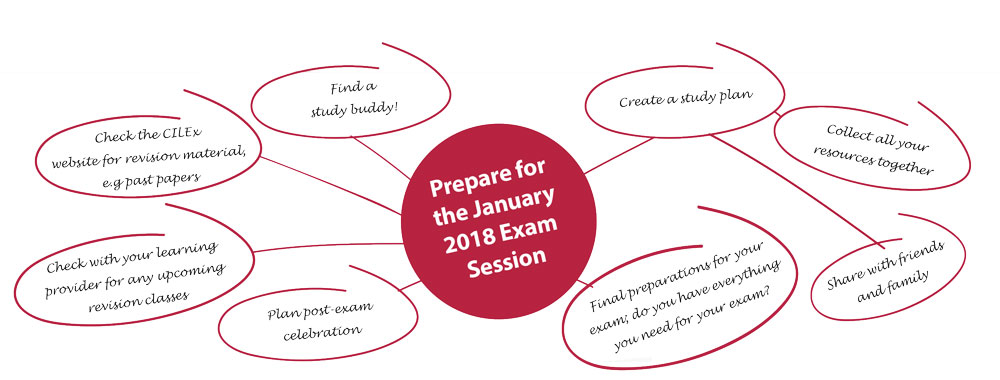Study area
Get ready to Plan, Practise, Prepare, and... Pass your examinations
In the first article of a new series, Liz Kemp describes how students can plan, practise, prepare and pass the CILEx January 2018 examinations.

About the author
Liz Kemp is head of qualifications at CILEx.
It’s only 12 weeks to the January examinations! It may seem a long time away but, with the festive season also upon us, to ensure success it’s time to start planning and preparing for your exams NOW.
You have probably already prepared for other exams at various times in your life, and know how best to do this. But it may be that you haven’t taken an exam for a long time, or you have never taken one in which the questions are based around professional work scenarios. If so, don’t worry: there is plenty of time to prepare yourself for success, and help is on hand.
Imagine that you have entered for a big race in January; you would never turn up on the day and expect to win or achieve your personal best without having undertaken some training and practice runs. If you begin planning now, you will have more chance that the race will go smoothly and success will then follow.
As with any test of skill, you should train for the event with determination to do well. Like an athlete, you will want to be at peak performance in January, so let’s start the training now.
Every successful event begins with a plan. The benefit of planning is that you can take control of the time you have between now and the exam. This is personal to you: only you will know how much time you have.
You might make better use of smaller amounts of time, for example, during your commute to work, to listen to pre-recorded material or read your own notes, or even use this as thinking time to make sure that you understand some key concepts. You might work better with larger blocks of time, so set aside half days or full days to do this. Everyone has different learning styles, and you can plan for whichever approach suits you best.
Negotiate time with family, loved ones, friends and even your employer. Everyone will want you to be successful, so let them know how they can support you. Can you reduce some commitments during this period, or share them with others to give you time to study and revise?
Don’t forget to plan in a reward or celebration at the end with those who are supporting you with your study – or even just to give yourself a pat on the back – this will help motivate you to do well.
Create a study plan - like the one opposite - this will help you to dedicate time to your revision while allowing for other commitments.
Block out the time you know you can’t use, and then use this tool to help you maximise the time you have and keep on top of your time for revision.
Set your plan with realistic goals: if you are very busy at work one week, are you really going to be able to study for long in the evenings? Weekends might be better for blocking out larger chunks of time.
| Date | Morning | Afternoon | Evening |
| Monday | |||
| Tuesday | |||
| Wednesday | |||
| Thursday | |||
| Friday | |||
| Saturday | |||
| Sunday |
Make good use of this planning phase to collect together all the resources you will need. Begin by thinking of what you have already achieved with your studies.
Have you reviewed the syllabus, and are you familiar with the main themes of the units? This is an excellent starting point, as it will confirm what you have already achieved and highlight any gaps.
Start to look through past papers to become familiar with the structure of your papers and questions.
This is also the perfect time to check if your distance-learning provider or local college will be holding revision sessions in the lead up to your exams. If so, then book them into your diary as they will really help you later in pulling together your learning and giving you the opportunity to practise. You might also find it helpful to join up with another student or colleague as a study buddy: you don’t have to do this alone!

Decide in your plan when you will block out your revision stage in the run up to the exam. This is where you will focus on key concepts and tackle exam questions.
When revising, don’t try and learn every word you have read: use techniques, such as mind maps or flow diagrams, rather than digesting large chunks of texts. You might find trying to explain concepts out loud, to yourself or to a study buddy, helps you identify your sticking points.
The best way to test yourself is by trying to answer questions under the same conditions as when you sit your exams, which means trying to answer the whole exam paper. This will help you with your time management during the real exam. You will find past exam papers on the website.¹ Find a quiet space, and try to write in the same time as you would have on the day. You can then use the suggested answers and Chief Examiners’ Reports to help you identify what you have learned and where the gaps are for you to concentrate on before the real exam.²
These reports are written by the examiners based on the full range of answer scripts, so you are getting the benefit of their hindsight on what students like you do well at and where common mistakes are made. This is really rich and useful information – written to help students understand what the examiners are looking for – so take time to read these reports and note what they say. You can find links to all these resources below. Check that you know how to locate them now.
Make a note of the areas you are unsure about, and put aside time to look specifically at those.
All this practice will help you get used to exams and exam pressure, which will hopefully remove some of the nerves on the day. The more you practise, the easier it will be on the day, and the more likely you are to succeed.

The final stage is the time for you to get into the right frame of mind for your examination. The last few days before the exam, you need to build up a positive mental attitude, so it’s time to relax; to try not to get stressed; and to make sure you know where your exam centre is and how you will get there, and that you have all you need for the day ready well in advance. Starting now will give you a good foundation in preparation for that final P… PASS!
1 A selection of past examination papers and the corresponding examiner reports are available to download at: http://tinyurl.com/h3ayc79
2 Suggested Answers for Level 3 Units, available at: http://tinyurl.com/yc9wjttd; Suggested Answers for Level 4 Units, available at: http://tinyurl.com/yahkrrtd; and Suggested Answers for Level 6 Units, available at: http://tinyurl.com/y9yxasm9. Chief Examiners' Reports for Level 3, Level 4 and Level 6, available at: http://tinyurl.com/y8edzy5k